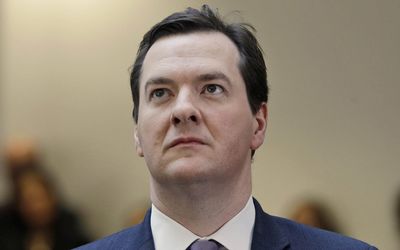UK interest rates look set to stay at their historically low level, thanks to worse-than-expected growth figures released yesterday by the Office for National Statistics.
While chancellor George Osborne was pleased with the 0.7% rise in gross domestic product (GDP) during the last quarter of 2013, it still fell short of the 0.9% forecast by the Bank of England’s Monetary Policy Committee (MPC).
Not only that, but the growth rate also slowed from the 0.8% the previous quarter which, taken together, means the swelling numbers of MPC members who support an interest rate hike will probably hold fire for the time being.
Of course, you wouldn’t have believed the recovery was still so anaemic given the rapturous headlines the ONS figures have provoked. With a general election due in May 2015, the government will accept any good news at all. So, the fact that the UK economy grew by 1.9% last year fits the bill nicely. For now.
“These numbers are a boost for the economic security of hard-working people,” said a bullish Osborne. “It is more evidence that our long-term economic plan is working.
“But the job is not done, and it is clear that the biggest risk now to the recovery would be abandoning the plan that’s delivering jobs and a brighter economic future.”
Bank of England interest rates have been held at the never-before low of 0.5% since March 2009, when the British economy slipped into the deepest recession for a generation following the global financial meltdown. Signs of recovery, plus a string of upgraded growth forecasts, had led some MPC members to support a rate rise.
However, growth poses as many problems for householders as it does low or no growth, because of the high levels of personal indebtedness. Many homeowners are only able to make their mortgage payments because interest rates are so artificially low. As soon as interest rates start to rise, which they inevitably will as growth takes hold, an estimated 1.2m homeowners could find themselves unable to cope. Many economists expect rates to be nearer 3% two years from now.
What’s more, growth is being supported by a range of extraordinary measures. In addition to ultra-low interest rates, the economy has been primed by £375bn of quantitative easing money, the £70bn Funding for Lending initiative and the Help to Buy scheme. Given the enormous stimulus, growth of 1.9% is fairly modest.
Though ONS chief economist Joe Grice said “we’ve seen growth in most parts of the economy”, various market analysts have voiced concerns for some time that this is an ‘unbalanced’ recovery that is over-reliant on housing market activity, as well as the service sector and consumer spending.
Speaking of growth figures released in November, for instance, Scotiabank economist Alan Clarke told Bloomberg: “Under the surface, the breakdown was not particularly pleasing. Most of the heavy lifting is coming from the consumer and stock building. That is not a great long-term prospect for growth.”
The government’s Help to Buy scheme, which has so far helped 13,000 homeowners obtain loans, underwrites loans for people who would otherwise not qualify. These loans are interest-free for the first nine months, and have helped first-time buyers to drive an 8.8% surge in house prices over the last 12 months.
However, while the ONS reports the strongest growth levels since the credit crunch took hold in late 2007, economic output is still 1.3% below its 2008 peak – dragged down by falling North Sea oil and gas production – in the most sluggish recovery from recession in 40 years. Business investment also remains depressed: last year, capital investment fell to its lowest level since the ONS dataset began in 1997.
So it’s probably best to keep the Champagne on ice, at least for now. Unbalanced growth and the UK’s personal debt mountain will have a big say over exactly where the recovery goes from here.

